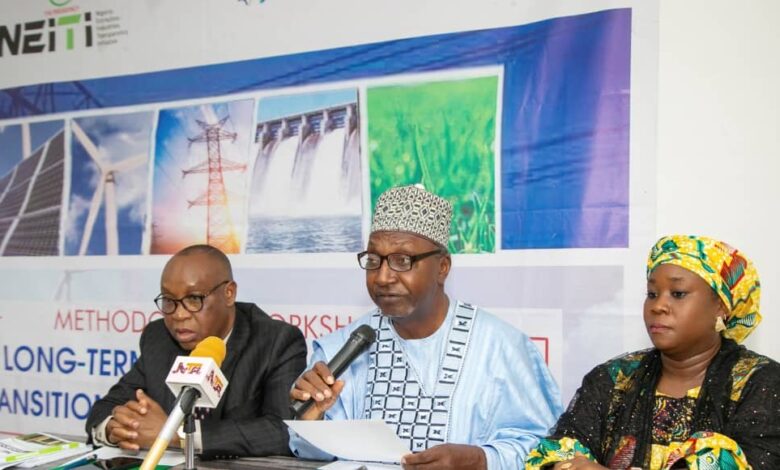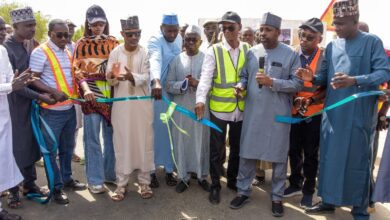
The Nigeria Extractive Industries Transparency Initiative (NEITI), has launched a research on the impacts of energy transition on Nigeria’s economy.
NEITI, in a statement by its Acting Director, Communications and Stakeholders Management, Mrs Obiageli Onuorah, disclosed that the research was launched on Tuesday.
According to the statement, a workshop on the focus, approach and methodology for the study which held in Abuja, brought together key stakeholders, experts, and policymakers to refine the study’s approach and provide strategic insights that would position Nigeria amidst global shifts in energy priorities.
Delivering the opening remarks on behalf of the NEITI Board, its Chairman, Senator George Akume represented by its alternate Chair, Ambassador Mathew Adoli, emphasized the urgent need for Nigeria to strategically respond to the challenges and opportunities presented by the global move towards cleaner energy.
“The transition from fossil fuels to renewable energy sources is no longer an abstract concept. It is a reality shaping policies, markets, and investment decisions worldwide. For Nigeria, an oil-dependent economy, this presents profound challenges and opportunities”.
“Our ability to navigate this transition effectively will determine not only the future of our energy sector but also the overall sustainability of our economy.” The Chairman stated.
The Chair outlined three critical areas of focus for the study which include, Revenue Diversification by accelerating reforms in non-oil sectors which should prepare Nigeria for declining oil revenues; Investment in Clean Energy that would attract global and domestic investment in renewable energy infrastructure and JustTransition that would ensure an inclusive and equitable shift to clean energy.
He reaffirmed the NSWG’s commitment to providing strategic oversight and facilitating stakeholder engagements to ensure the success of the study.
Executive Secretary of NEITI, Dr. Orji Ogbonnaya Orji, further highlighted the study’s significance, linking it to key findings from the recently released NEITI’s 2023 Oil and Gas Industry Report. Some of these findings are the 15% decline in Oil Revenues between 2022-2023; and 8% decrease in Nigeria’s production volumes between 2022 and 2023 with the reserve-replacement ratio steadily declining.
Dr. Orji emphasised that the findings in the NEITI reports signaled the growing impact of global energy transition policies, which underscores the urgency of addressing Nigeria’s energy transition impacts.
The executive secretary also noted the progress that Nigeria has made against oil theft, pointing out that the NEITI 2023 report showed a reduction of 79% in crude oil losses due to theft. This he said, Reflects improved resource management.
The NEITI Executive Secretary, commended the office of the National Security Adviser, the Nigeria Armed Forces and our security agencies for the drastic approach so far resulting in visible decline in Crude Theft as disclosed by NEITI’s latest report. Dr Orji appealed to Security Agencies to sustain the fight against oil theft.
The Energy Transition methodology workshop provided an interactive platform for participants to make input into the study’s framework, ensuring that it is rigorous, inclusive, and reflective of Nigeria’s unique circumstances. Stakeholders were encouraged to contribute by suggesting additional data sources to enrich the study, identify gaps in the research framework and propose strategies to ensure broad consultation across sectors.
“This is not just a NEITI study; it is a collective project, its findings will inform national policies, guide investment decisions, and shape Nigeria’s future in a world transitioning to clean energy.” Dr. Orji stated.
He enumerated the terms of reference and scope of the study to include establishing a global trend and projections on crude oil demand in the next ten years, Reviewing Nigeria’s energy transition plan, related government policies and its adequacy for the country’s transition targets, supporting NEITI’s mandate in a changing energy landscape and aligning government’s ET plan with the EITI evolving standard on climate change and energy transition.
The representative of the Civil Society on the NEITI Board, Dr Erisa Danladi Sarki welcomed the inclusion of civil society in the ongoing stakeholder’s consultation process for the study but called for particular attention to be paid to the negative impacts of energy transition and climate change on women and children as well as gender diversity.
Stakeholders at the meeting affirmed their shared commitments to transparency, accountability and collaboration. The study’s outcomes will play a pivotal role in shaping Nigeria’s policy responses, guiding investments in clean energy, and ensuring that the energy transition is both sustainable and inclusive.
.






